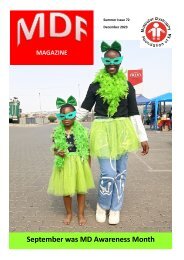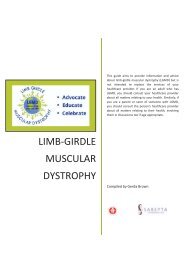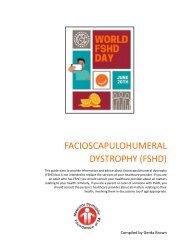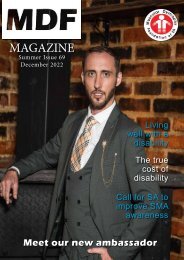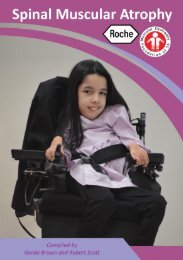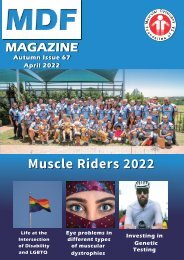MDF Magazine Issue 64 April 2021
You also want an ePaper? Increase the reach of your titles
YUMPU automatically turns print PDFs into web optimized ePapers that Google loves.
Healthy Living
Still, based on the evidence to date, the FDA does not
feel concerned that the COVID-19 vaccines will cause
any harm to those with a rare disease ‒ including those
with a compromised immune system ‒ Marks said.
“It is really hard to study vaccine efficacy and
safety in one rare disease, because we just don’t
have enough people with those diseases to come to significant
conclusions,” said Stephen Hahn, the commissioner
of the FDA.
The bigger question, he said, is whether they will be as
effective among this population. At this point, scientists
don’t know for sure the answer to that question.
But since many people with rare diseases ‒ particularly
those with any form of respiratory compromise or diabetes
‒ are at risk of more severe COVID-19 infections,
“the benefit may outweigh the risks,” Marks said. He
stressed the importance of patients discussing the individual
benefits and risks of the vaccines with their own
healthcare providers.
With some in the rare disease community hoping to
access gene therapies in the not-so-distant future,
patients have expressed concern about the risk of being
unable to access these medications after receiving the
vaccine, due to the development of antibodies against
the viral vector.
Marks said this should not be an issue, noting that the
vaccines “are packaged essentially in a soap bubble, and
the soap bubble is not like … any of the adeno-associated
viruses that are being used for directly administering
gene therapy, nor is it like any of the other vectors
that are being used.”
“The likelihood of something happening here,
where one of these vaccines would preclude
you from getting a gene therapy, is pretty much nonexistent,”
he said.
When asked whether the rare disease community should
choose one of the COVID-19 vaccines over the other,
Marks explained that they are similar vaccines, with very
close dosage schedules.
The two available vaccines both use messenger RNA
(mRNA) ‒ the intermediate molecule that carries information
from the DNA to produce a protein ‒ to teach cells how
to make viral proteins that trigger an immune response
to SARS-CoV-2, the virus that causes COVID-19.
Both vaccines have shown 94‒95% efficacy, meaning
that they have prevented that percentage of patients
from becoming infected, relative to placebo treatments.
By comparison, the annual influenza vaccine is typically
about 70% effective.
The two COVID-19 vaccines also showed strong safety
profiles, with allergic reactions occurring on the order
of one in 100,000 individuals or less. Notably, the reactions
that did occur appeared to be triggered by one of
the vaccine components, which Hahn says both the FDA
and CDC are investigating.
“For all intents and purposes, these are
very similar vaccines,” Marks said, adding
“I cannot say that one is better than the other.”
In the very rare case that someone does experience an
allergic reaction, Amanda Cohn, chief medical officer in
the Office of Vaccine Policy at the CDC, says that vaccine
administration sites are trained and equipped to handle
the situation, with necessary medications on hand. The
CDC recommends waiting 30 minutes after receiving
the injection so that any symptoms that do arise can be
promptly treated.
Cohn also addressed the concern of who gets vaccinated,
and when and where. Cohn said that local jurisdictions
can exercise flexibility in these decisions, as
they best know how to serve the needs of their individual
communities. Information about available vaccinations
can be found on state health department websites
and directly from most large healthcare systems; many
municipalities also are offering the vaccine through their
health and emergency services agencies.
A final concern that the panel addressed was that of the
new SARS-CoV-2 variants, such as the one recently
discovered in the United Kingdom. Although this virus
appears to spread faster than other strains, the current
vaccines so far appear effective against it, Marks said.
“Right now, whatever you can get in your arm
in a timely manner, that’s the vaccine that’s the best,”
he said.
“More troubling,” he said, “is a South African
variant, which may be less well-covered.”
45





